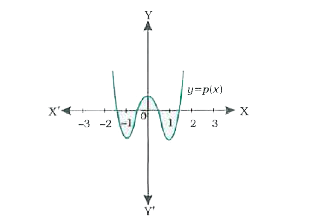Answer each question by selecting the proper alternative from those given below each question so as to make the statement true :
The quadratic polynomial whose sum and product of zeroes are −3 and 2 respectively is………..Solution in Gujrati
x2+3x+2
x2−3x−2
x2+2x+3
x2−2x−3
The correct Answer is:A
Step by step video, text & image solution for Answer each question by selecting the proper alternative from those given below each question so as to make the statement true : The quadratic polynomial whose sum and product of zeroes are -3 and 2 respectively is……….. by Maths experts to help you in doubts & scoring excellent marks in Class 10 exams.
Updated on:21/07/2023Topper's Solved these Questions
- POLYNOMIALSBook:KUMAR PRAKASHANChapter:POLYNOMIALSExercise:PRACTICE THOROUGHLY
Explore 20 Videos
- PAIR OF LINEAR EQUATIONS IN TWO VARIABLES Book:KUMAR PRAKASHANChapter:PAIR OF LINEAR EQUATIONS IN TWO VARIABLES Exercise:Test Your Skills
Explore 48 Videos
- PROBABILITY Book:KUMAR PRAKASHANChapter:PROBABILITY Exercise:OBJECTIVE QUESTIONS (State whether each of the following statements is true or false:)
Explore 5 Videos
Similar Questions
Find the zeroes of the following quadratic polynomials by factorisation method and verify the relationship between the zeroes and the coefficients of the polynomial :
x2−7x+12
View SolutionIf the numerator of a fraction is decreased by 1. It reduces to 12 and if its numerator is increased by 1. it reduces to 1. Represent this situation algebraically and graphically.
View SolutionFor any event A, P (A) is always greater than P(¯¯¯A).
View SolutionAnswer each question by selecting the proper alternative from those given below each question so as to make the statement true :
The number of zeroes lying between −1 and 1 of the polynomial p(x), whose graph is given, is…………

View SolutionAnswer each question by selecting the proper alternative from those given below each question so as to make the statement true :
The quadratic polynomial for which the sum and product of zeroes are 4 and 4 respectively is……….
View SolutionAnswer each question by selecting the proper alternative from those given below each question so as to make the statement true :
The quadratic polynomial with zeroes 5 and 3 is………..
View SolutionAnswer each question by selecting the proper alternative from those given below each question so as to make the statement true :
The zeroes of the polynomial x2+2x−15 are……….
View SolutionAnswer each question by selecting the proper alternative from those given below each question so as to make the statement true :
For the cubic polynomial p(x)=x3−x2−17x−15, the sum of the products of zeroes taken two at a time is……….
View SolutionAnswer each question by selecting the proper alternative from those given below each question so as to make the statement true :
The zeroes of polynomial x2+99x+127 are…………
View SolutionAnswer each question by selecting the proper alternative from those given below each question so as to make each statement true :
The sum of the first n terms of the AP √2,√8,√18,√32 ......is .......
View SolutionAnswer each question by selecting the proper alternative from those given below each question so as to make each statement true :
If the nth term of AP is 2n +1 , then the sum of first n terms of the AP is ..........
View SolutionAnswer each question by selecting the proper alternative from those given below each question so as to make each statement true :
If k + 2, 4k - 6, 3k - 2 are three consecutive terms of an AP, then k = ..........
View SolutionAnswer each question by selecting the proper alternative from those given below each question so as to make each statement true :
The sum of first n terms of the AP a, 3a,5a,......is .......
View SolutionAnswer each question by selecting the proper alternative from those given below each question so as to make each statement true :
The opposite angles of a parallelogram are ………….
View SolutionAnswer each question by selecting the proper alternative from those given below each question so as to make each statement true :
The area of an equilateral triangle =………..
View Solution

